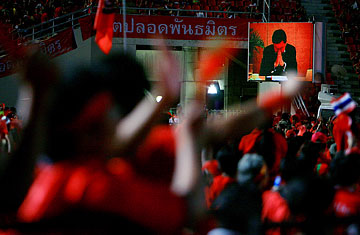
Former Prime Minister Thaksin Shinawatra gives a live address to a rally of his supporters at Bangkoks Rajamangala National Stadium on Nov. 1, 2008
The life of an exiled leader used to be a comfortable one. Uganda's Idi Amin whiled away his post-dictator years in Saudia Arabia, while the Philippines' Ferdinand Marcos spent the rest of his days in Hawaii. But Thaksin Shinawatra, Thailand's former Prime Minister who was overthrown in a bloodless coup two years ago, is having a harder time finding a new place to call home. Earlier this month, Thaksin had his British visa revoked, shortly after a Thai court sentenced him in absentia to two years' imprisonment for a conflict of interest conviction. The Thai telecoms tycoon had spent a good deal of time in England after his ouster, making headlines by buying the Manchester City soccer team before selling it to a Middle Eastern investor group earlier this year. Thaksin was in China when his ban from Britain was publicly announced.
Britain hasn't been the only one to distance itself from Thailand's controversial ex-premier. On Monday, a presidential spokesman from the Philippines said that should Thaksin be interested in settling there, he should look elsewhere. Thai courts have issued arrest warrants for both Thaksin and his wife, and harboring fugitives from justice is presumably not something countries with close relations to Thailand would want to do. (Thaksin has denied wrongdoing in all court cases against him, claiming they are politically motivated.)
Although Thaksin is legally barred from re-entering Thai politics and faces jail time should he return home, he still enjoys wide support among many Thais, particularly those from the impoverished northeast. It was their votes in last December's elections that brought to power the Peoples Power Party, a reconstituted version of Thaksin's banned party. Thailand's current Prime Minister Somchai Wongsawat is Thaksin's brother-in-law and is considered by government critics as little more than a puppet. Indeed, the opposition alliance that has occupied Thailand's seat of power, Government House, for more than two months, vows to continue its siege until a leader they consider independent of Thaksin is brought to power. While thousands of protesters occupy his office grounds, Somchai has been forced to work out of the VIP lounge of Bangkok's old airport.
In a Nov. 1 telephone address to tens of thousands of his supporters who had gathered in a Bangkok stadium, Thaksin brushed off concerns about his refuge woes. Several countries, he has claimed, have offered him honorary citizenship. Although Thaksin didn't specify his possible future home, the Bahamas did express initial willingness to host the former premier when he fled Thailand this summer after his wife was found guilty of tax evasion. Thai media have also reported that the Central African Republic might take Thaksin in if he's willing to invest some of his fortune in one of Africa's poorest countries.
But living in Bangui, the Central African Republic's capital, probably isn't high on Thaksin's destination list. After all, the former Thai premier has a fondness for luxury shopping and golf — and has indulged both diversions fully since he was forced from office two years ago. (In a sign that Thaksin may be resigned to a longer exile, he gave up one of his last official connections to his homeland on Tuesday, that of President of the Professional Golfers Association of Thailand.) Loss of pride aside, Thaksin can at least take heart in the august company of others who have been barred from entering Britain. Earlier this year, American domestic diva Martha Stewart was denied a visa because of her brief jail stint, the same fate that befell Cordozar Calvin Broadus, better known as rapper Snoop Dogg.
Chen Shui-bian